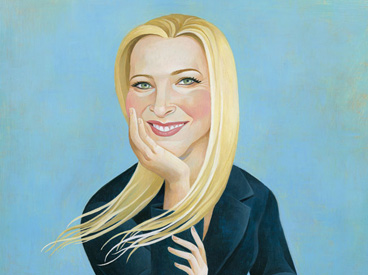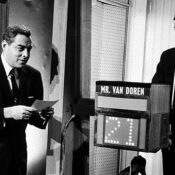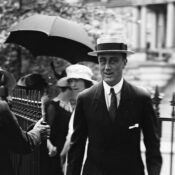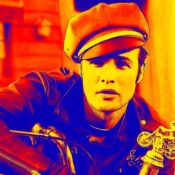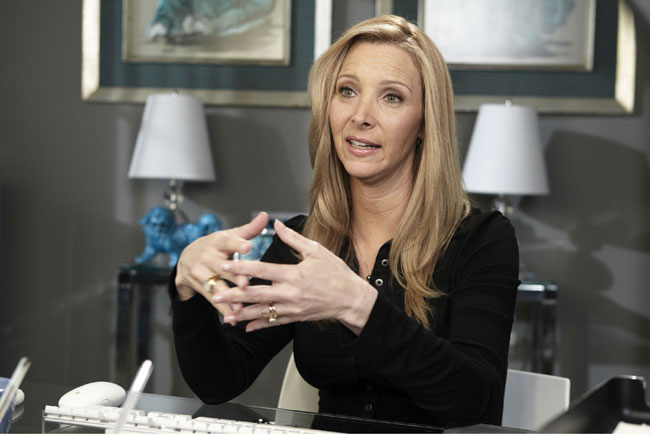
Credit: Showtime Networks Inc./Photofest
Q: Have you ever experienced anti-Semitism?
LK: Yes, I have. In college there was more anti-Semitism than before college, because there were people who never met a Jew before. A friend of mine, when she found out I was Jewish, said, “Really? Oh, I don’t like Jews.”
Q: Can you relate the story of how your two best friends in junior high school told you they didn’t want to be friends with you anymore?
LK: That happened in seventh grade when we moved from sixth grade to a new school. So they knew some people, and I didn’t. Eventually they just got tired of me being a tag-along. They said, “For your own good, you need to see what would happen if we weren’t here.” It was really brutal. Very hard.
Q: Turned your world upside down?
LK: Yeah, it did. It was just mean. And all of junior high felt upside down to me. It was not, like, the nice people who were popular; it wasn’t the most entertaining people—it was the meanest people who were popular. We were reading Macbeth at the time, and I remember the three witches: “What’s fair is foul and foul is fair.” That’s all I could hear in my head during that whole period. When my friends dropped me I was asking my parents, “What did I do?” And my father would say, “F ’em.” His answer to everything. And my mother would say, “You can’t do that.”
Q: Was it your older sister who rescued you from being isolated in school?
LK: She did, definitely. Unbelievable of her too, because I was 13 and she was 20. She would find out when our half days were, when everyone would go out to lunch and I would have no one to eat with. She would pick me up and take me to lunch. That’s extraordinary to me. It was just very generous of her to be so sensitive and aware, even though there was nothing anyone could do.
Q: You did something about your appearance, having your nose fixed when you were 16.
LK: That was life altering. I went from, in my mind, hideous, to not hideous. I did it the summer before going to a new high school. So there were plenty of people who wouldn’t know how hideous I looked before. That was a good, good, good change.
Q: In high school you spent a summer at Cornell University. How did that go?
LK: It didn’t go well. I failed the two classes I took. I was a wreck over those classes. One was Jewish history class and the other was writing. I got caught up in the social stuff.
Q: How did you get into Vassar?
LK: Well, I didn’t let anyone know I went to Cornell. [Laughs.]
Q: How happy were you at Vassar?
LK: When I got there I was smiling so much that everyone thought I was an idiot.
Q: Both your father and brother advised you against med school. Why?
LK: I was saying that I wasn’t sure I wanted to go to medical school, and my father said, “Great, don’t.” My brother, too. He was in medical school at the time. And they both said “If you’re not sure you want to be a practicing physician, then don’t. Because it’s a lot of work to get there. And if you go through all that work, and then change your mind, one other person could have taken your spot and become a physician.”
Q: You worked for your father for eight to 10 years — what did you do?
LK: I started off doing research, because my goal was still to go to graduate school and I wanted to be published. But after a few months I realized if I wanted to try acting, now was the time to do it! My father agreed. So I just stopped the research after that one project and became a receptionist for him.
Q: Did any of his research influence your decision about trying any mind-altering drugs?
LK: I never tried that stuff. Because he would tell me stories of people who had smoked pot one time and they had a psychotic break and never recovered. And I thought, well, who wants to roll those dice? I don’t care what the odds are. [Laughs] I don’t like being altered.
Q: What about your teenage son, Julian?
LK: Well, he’s decided, and he’s not wrong, that since I used to smoke and now chew Nicorettes, that I’m an addict.
Q: What has being a mother taught you?
LK: My first rule of parenting is get to know other parents. It’s so unfair that kids aren’t allowed to go through a little something. Kids are overly scrutinized and that’s really too bad for them. One week I heard, “Oh, your kid’s not able to focus. And I’ve been noticing it for a while now.” “A while?” “Yeah, like two weeks. You ought to look into medication.” Fortunately there were other mothers to talk to about it.
Q: Your son Julian is 15; how’s he doing in school?
LK: He’s a big thinker, but he’s impatient with the details because he wants to jump to the bigger stuff. In that way he’s intellectual. But that’s a different skill set than organizing, outlining, and studying for a test. Maybe he’ll be a philosophy major [laughs].
Q: You were bat mizvah’d. Was he bar mitzvah’d?
LK: Yes, and no. It was similar to me. I was bat mitzvah’d because I asked my parents for it, and we had a friend who was a rabbi who agreed to tutor me—not in person but with tapes I listened to, and then I read phonetically. My son sort of wanted a bar mitzvah, but it was a lot of work, and we didn’t belong to a temple. But then he was at the mall and two Hassidic Jews, I think they were Chabad-Lubavitch, they went up to him and asked, “Are you Jewish? Did you have a bar mitzvah?” He said he was half-Jewish. They asked, “Your mother?”
“Yeah.”
“Great, come here, we’ll give you a bar mitzvah in 30 seconds.” They did a ritual, took a picture. He was all by himself, and he had his own bar mitzvah.
Q: That’s a very funny story.
LK: It is. It was a drive-by bar mitzvah. [Laughs.]
Q: Why was it a tough decision for you to become an actress?
LK: Because I thought actors were egocentric people with bad judgment. And anyone who wanted to do that, it wasn’t very mature.
Q: Conan O’Brien was in your first improv class. How impressive was he?
LK: He was so impressive that he saved me from quitting the whole notion of acting. I had come late to the second class, and I wasn’t sure I was going to stay with it. It was too embarrassing. I felt I looked so silly doing some of the exercises. So I sat down to watch people make fools of themselves. And then I saw this very childlike guy throwing a space ball, but it looked like he was throwing an actual ball. It didn’t look stupid, and he wasn’t overdoing it. He was totally committed to it. I finally got it — that as long as you totally commit you’re safe from embarrassment.
Q: He credits you with becoming a talk show host. True?
LK: Yeah! I was very encouraging. I remember saying, “If Letterman’s leaving his late-night show, he’s irreplaceable. So better it be someone we don’t know at all.” So I thought he should look into it.
Become a Saturday Evening Post member and enjoy unlimited access. Subscribe now
